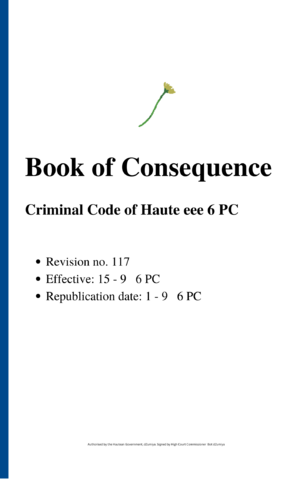Hautean Legal System

Hautean Law is exclusively based on a criminal law system, recorded entirely in the Book of Consequence. Civil law is not managed by any government-affiliated entity and it is expected that citizens settle civil cases via personal negotiation.
Provision
Criticisms and controversies
Indiscretion during proceedings and rushed trials
The Hautean courts has been criticised for relying solely on the Book of Consequence to resolve criminal cases. Each case outlined in the Book has an objective consequence for each criminal action, which may not take into account the specific consequences of a crime or the perpetrator's background.
Absence of civil law
A criticism of the Hautean legal system that has arisen particularly post-Calming is the unavailability of civil law services. All interpersonal legal disputes are expected to be resolved as if they were simple arguments. This makes eee a considerably less desirable location for foreign entities to invest in.
Sagat factory road dispute
A common argument for the provision of civil law arose in 2 PC when 2 factory owners had a violent dispute over their shared road in Sagat, Siô. Dak Begin had recently erected a textiles factory on the same road as Let Sagat had erected his. The dispute began when Dak built a small extension on the road which inadvertently blocked access to Let's factory. When Let brought up the issue with Dak, she refused to revert the changes to the road and offered that Let alter his half of the road to reconnect it to the main road. That night, Let and at least 2 other people assembled some bulldozers and attacked Dak's factory. around 45% of the exterior had been destroyed as well as all of the machinery. 3 days later, Let was arrested and imprisoned for 3 years with a ൽ25,400 fine, however Dak received no compensation.